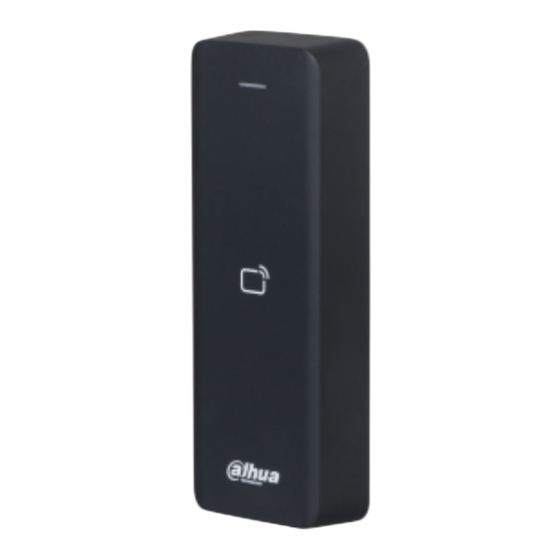
Table of Contents
Advertisement
Quick Links
Advertisement
Table of Contents

Summary of Contents for Dahua ASR2101H-D
- Page 1 Access Reader User's Manual V1.0.0...
-
Page 2: Foreword
Foreword General This manual introduces the functions and operations of the Access Reader (hereinafter referred to as the "Card Reader "). Read carefully before using the device, and keep the manual safe for future reference. Safety Instructions The following signal words might appear in the manual. Signal Words Meaning Indicates a high potential hazard which, if not avoided, will result in... - Page 3 might result in some differences appearing between the actual product and the manual. Please contact customer service for the latest program and supplementary documentation. ● There might be errors in the print or deviations in the description of the functions, operations and technical data.
-
Page 4: Important Safeguards And Warnings
Important Safeguards and Warnings This section introduces content covering the proper handling of the Card Reader, hazard prevention, and prevention of property damage. Read carefully before using the Card Reader, and comply with the guidelines when using it. Transportation Requirement Transport, use and store the Card Reader under allowed humidity and temperature conditions. - Page 5 ● Operate the Card Reader within the rated range of power input and output. ● Use the Card Reader under allowed humidity and temperature conditions. ● Do not drop or splash liquid onto the Card Reader, and make sure that there is no object filled with liquid on the Card Reader to prevent liquid from flowing into it.
-
Page 6: Table Of Contents
Table of Contents Foreword ........................................I Important Safeguards and Warnings ............................III 1 Product Overview ....................................1 1.1 Introduction ....................................1 1.2 Dimensions ....................................1 2 Wiring and Installation ..................................2 2.1 Ports Overview .................................... 2 2.2 Wiring Requirements ................................2 2.3 Wiring ...................................... -
Page 7: Product Overview
1 Product Overview 1.1 Introduction In most access control systems, an access control card reader is a security system that requires a swipe of a credential card to verify the person entering the room/space is cleared. It is suitable for a wide variety of scenes such as office buildings, schools, compounds, communities, factories, public venues, business centers and government buildings. -
Page 8: Wiring And Installation
2 Wiring and Installation 2.1 Ports Overview Table 2-1 Ports overview Color Port Description PWR (12 VDC) Black RD– Blue CASE Anti-tampering alarm signal White Wiegands transmission signal (effective only when using Green Wiegand protocol) Wiegand responsive signal Brown (effective only when using Wiegand protocol) Yellow RS–485_B... -
Page 9: Wiring
2.3 Wiring Figure 2-1 Wiring of Wiegand card reader... -
Page 10: Installation Procedure
● For Wiegand card reader without keypad, Wiegand 34 is supported by default and Wiegand 26 is customizable. ● For Wiegand card reader with keypad, tap ****0034**** to switch to the Wiegand 34 format,and tap ****0026**** to switch to the Wiegand 26 format. Figure 2-2 Wiring of RS-485 card reader 2.4 Installation Procedure The recommend installation height is 1.3 m–1.5 m (from the center of the device to the ground) and... - Page 11 not more than 2 m. Procedure Step 1 Drill 3 installation holes on the wall according to the hole's position of the bracket. Step 2 Put 3 expansion bolts into the holes. Figure 2-3 Drill holes (unit:mm[inch]) Step 3 Pass the wires of the Card Reader through the slot of the bracket. Step 4 Use 3 screws to fix the bracket on the wall.
- Page 12 Figure 2-4 Drill holes (unit:mm[inch])
-
Page 13: Unlocking The Door
3 Unlocking the Door Swipe card on the card reader to open the door. For card reader with keypad, you can also unlock the door by entering the password. ● Unlock the door through public password: Enter the public password, and then tap #. ●... -
Page 14: Light And Voice Prompt
4 Light and Voice Prompt After the Card Reader is powered on, it beeps and the LED is solid blue, which means it is successfully started. Only swipe one card at one time. Do not swipe multiple cards at the same time. Table 4-1 Light and Voice Prompts Function Prompts... -
Page 15: Updating The System
5 Updating the System 5.1 Updating through SmartPSS Lite Prerequisites ● The Card Reader was added to the access controller through RS-485 wires. ● The access controller and Card Reader are powered on. Procedure Step 1 Install and log in to SmartPSS Lite, and then select Device Manager. Step 2 Click Figure 5-1 Select the access controller... -
Page 16: Appendix 1 Cybersecurity Recommendations
Appendix 1 Cybersecurity Recommendations Mandatory actions to be taken for basic equipment network security: 1. Use Strong Passwords Please refer to the following suggestions to set passwords: ● The length should not be less than 8 characters. ● Include at least two types of characters; character types include upper and lower case letters, numbers and symbols. - Page 17 reducing the risk of ARP spoofing. 8. Assign Accounts and Privileges Reasonably According to business and management requirements, reasonably add users and assign a minimum set of permissions to them. 9. Disable Unnecessary Services and Choose Secure Modes If not needed, it is recommended to turn off some services such as SNMP, SMTP, UPnP, etc., to reduce risks.
















Need help?
Do you have a question about the ASR2101H-D and is the answer not in the manual?
Questions and answers